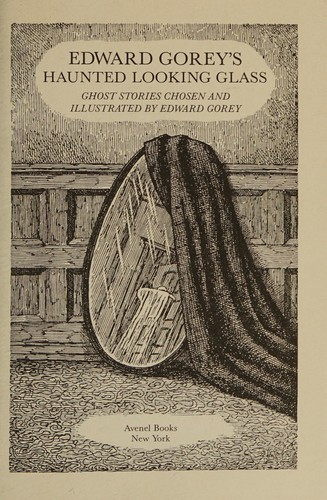emfiliane reviewed The haunted looking glass by Edward Gorey (New York Review Books classics)
Review of 'The haunted looking glass' on 'Goodreads'
4 stars
This is one of the most interesting books I've read of late, I must say. It's a collection of short fiction from the turn of the last century, writer Edward Gorey's favorites, and they range from odd to downright spooky. It begins with explorers in a haunted house, and over 250 pages manages to cover much of the breadth of late Victorian English ghost stories.
Each tale is definitely unique. A couple involve haunted houses, some demons from hell, mysterious magic, ancient curses, strange events, and normal humans on the underbelly of society, afflicted with a dose of the supernatural. There are both long ones, nearly novellas, and more succinct pieces. None are truly gruesome or horrifying, with the exception of "The Body-Snatcher", but rare are the pages that will not send chills down your spine. These writers were the masters of their times, thrilling audiences from newspapers and bookstands. …
This is one of the most interesting books I've read of late, I must say. It's a collection of short fiction from the turn of the last century, writer Edward Gorey's favorites, and they range from odd to downright spooky. It begins with explorers in a haunted house, and over 250 pages manages to cover much of the breadth of late Victorian English ghost stories.
Each tale is definitely unique. A couple involve haunted houses, some demons from hell, mysterious magic, ancient curses, strange events, and normal humans on the underbelly of society, afflicted with a dose of the supernatural. There are both long ones, nearly novellas, and more succinct pieces. None are truly gruesome or horrifying, with the exception of "The Body-Snatcher", but rare are the pages that will not send chills down your spine. These writers were the masters of their times, thrilling audiences from newspapers and bookstands. These are tales to be told in the cover of darkness, where the shadow takes firm grip upon the soul of the unwary, tales to be told aloud, for the chuckle and boom of a voice will bring their ghosts to life.
To those who would enjoy such tales, and I believe that includes a very wide range, this book is probably one of the best samplers of the genre, a solid footstep from which more can be found. Certainly several of the authors I've already sought out more from. At least some of the stories are bound to appeal to almost anyone, especially on a foggy night around a fireplace. Some are better than anything I've ever read from Stephen King and other modern dealers of this type. Not to mention that I simply enjoyed the archaic dialect of these, being a fan of the old styles. You will not regret picking this book up, as it so forcefully captures the imagination. Not all so captured me, but as I said, variety is the key here, and something is bound to appeal to everyone.
My personal favorites were probably Harvey's "August Heat" and James' "Casting the Runes", on opposite ends of the book, nicely pulling me in and leading me out. "Heat" is short, sweltering, and eerie, ending in such a way that is simply too powerful; "Runes" about a the thrilling unraveling of a mystery surrounding a warlock who hexed a man. "The Thirteenth Tree" is perhaps not the most exciting, but definitely is mysterious. The title of "A Visitor From Down Under" has a double meaning, and the story embodies the psychadelia and madness of the period. Rats both haunt and protect a university student in "The Judges House", but little can stop the real horror that lives there. In "The Monkey's Paw" one wish brings ruin on a family, and a second used in desperation seems to bode more... "The Empty House" casts its siren call over an old woman, who brings her nephew in only to witness an invisible murder. The namesake of "The Signalman" has some ability to see future accidents. And in the bloody "Body-Snatcher", medical college students must take criminal steps to ensure a supply of cadavers, until one turns on them.

